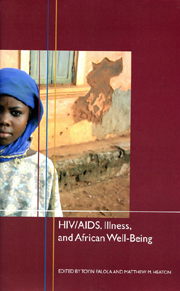Book contents
- Frontmatter
- Contents
- Acknowledgments
- Part I Context
- Part II Illness Case Studies
- Part III Globalization, Development, and Health
- Part IV HIV/AIDS
- 12 Of Savages and Mass Killing: HIV/AIDS, Africa and the Crisis of Global Health Governance
- 13 Vicissitudes of AIDS Policies in Burkina Faso from 1985 to 2001: A Historical Perspective
- 14 Factors Associated with Deliberate Attempts to Transmit HIV Infection among Persons Living with HIV/AIDS in Tanzania
- 15 Development and Alternative Mitigation Treatment Opportunities of the HIV/AIDS Epidemic
- 16 Confusion, Anger, and Denial: Results of HIV/AIDS Focus Group Discussions with Urban Adult Zimbabweans
- 17 Three Proposals for Analyzing the Economic Growth Effects of HIV/AIDS in Sub-Saharan Africa
- List of Contributors
- Index
- Rochester Studies in African History and the Diaspora
16 - Confusion, Anger, and Denial: Results of HIV/AIDS Focus Group Discussions with Urban Adult Zimbabweans
from Part IV - HIV/AIDS
Published online by Cambridge University Press: 05 February 2013
- Frontmatter
- Contents
- Acknowledgments
- Part I Context
- Part II Illness Case Studies
- Part III Globalization, Development, and Health
- Part IV HIV/AIDS
- 12 Of Savages and Mass Killing: HIV/AIDS, Africa and the Crisis of Global Health Governance
- 13 Vicissitudes of AIDS Policies in Burkina Faso from 1985 to 2001: A Historical Perspective
- 14 Factors Associated with Deliberate Attempts to Transmit HIV Infection among Persons Living with HIV/AIDS in Tanzania
- 15 Development and Alternative Mitigation Treatment Opportunities of the HIV/AIDS Epidemic
- 16 Confusion, Anger, and Denial: Results of HIV/AIDS Focus Group Discussions with Urban Adult Zimbabweans
- 17 Three Proposals for Analyzing the Economic Growth Effects of HIV/AIDS in Sub-Saharan Africa
- List of Contributors
- Index
- Rochester Studies in African History and the Diaspora
Summary
This chapter reports the results of focus groups conducted with urban adults in Zimbabwe. The focus groups were designed to extract information about people's knowledge of HIV/AIDS as well as information about people's preventive behavior and their responses to televised HIV/AIDS public service announcements (PSAs). Premised by the Extended Parallel Process Model, the focus groups produced illuminating results. In this chapter I begin by giving some background information about the HIV/AIDS situation in Zimbabwe. Next I examine the Extended Parallel Process Model (EPPM), a model that was initially designed to explain fear appeal processes in HIV/AIDS messages. Finally, I outline the methods of data collection and data analysis that were used and the indicators of rigor that were used to assess the quality of the research before relaying the results of the focus group discussions.
Because past research sufficiently documents that women are more at risk of HIV infection, I augment those findings by arguing that women in Zimbabwe are at a disadvantage regarding the practice of safe sex as a result of cultural practices that increase their chances of infection. Such practices include gender hierarchies, sexual cleansing, polygyny, the preference for dry sex, and the importance of female fertility. Although these issues are not directly addressed in mass-mediated HIV/AIDS prevention messages, women are aware of them and are largely aware of the high risk that these practices pose.
- Type
- Chapter
- Information
- HIV/AIDS, Illness, and African Well-Being , pp. 352 - 385Publisher: Boydell & BrewerPrint publication year: 2007



